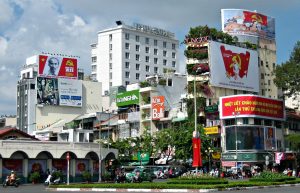Vietnam’s ruling Communist Party has entered a week-long conclave in preparation for next month’s massive 13th National Congress, which will set the country’s political trajectory for the next five-year term.
The current week-long meeting, known in party-speak as a plenum, will reportedly include discussion of “personnel documents” – a euphemism for deciding the key personnel appointments that will be made at the quinquennial Congress.
These include the so-called “four pillars”: the posts of state president, prime minister, general secretary of the Vietnamese Communist Party (VCP), and chairperson of the national assembly.
Such plenary sessions are typically preceded and accompanied by an intense scrutiny of tea leaves, as observers seek to wring meaning from the wooden formulations of the state-run media and the appearances (and non-appearances) of senior officials at major state events.
From what we know, next month’s Congress is widely expected to be “competitive” and “unpredictable” compared to the last party conclave in 2016, as Du Nhat Dang wrote in these pages last week, while media reports have noted the lack of obvious frontrunners for the “four pillar” positions.
One pressing question is whether Nguyen Phu Trong will retain his post as general secretary of the VCP. Since the last National Congress in 2016, when Trong engineered the removal of former Prime Minister Nguyen Tan Dung, the 76-year-old has earned credibility among both the party and wider society for his “furnace blazing” campaign against corruption.
The campaign has netted thousands of incumbent and retired party and government officials, many of them related to the patronage networks of former Prime Minister Dung. Among the biggest fishes have been Le Thanh Hai, the former party boss of Ho Chi Minh City, sitting Politburo member Hoang Trung Hai, and Nguyen Duc Chung, the Chairman of the Hanoi People’s Committee.
By purging political rivals and tackling the cancer of corruption – a typical one stone, two birds scenario – Trong has been able to amass more power than any Vietnamese politician in decades. In 2018, he was granted the role of president after the incumbent president died, giving him the rare distinction of holding two of Vietnam’s four main leadership positions simultaneously.
But Trong’s health has been the subject of some concern since he suffered a stroke in April 2019, and the party leader has appeared frail at events in recent months. As Hai Hong Nguyen of the University of Queensland wrote for East Asia Forum last month, there is a good chance that Trong will step down from his current positions at the 13th Congress, but he is nonetheless “intent on guiding, if not directly selecting, his successor.”
At a plenum in January 2020, Trong issued a regulation setting out new criteria for electing the four-pillar positions. According to Regulation No. 214, the top four leaders must be “the center of unity” within the party and earn a “high reputation in the mass population.” (Reuters has a handy list of the leading contenders for the four main posts here.) This suggests that he is seeking to find someone in his ideological mold, who can unite the party around a similar set of principles to his own term as party chief.
Another question surrounds the fate of Prime Minister Nguyen Xuan Phuc, who could make a pitch for a second term in office, or seek to jump over to the role of party chief. The 66-year-old’s stocks are riding high after a year in which Vietnam has chaired the Association of Southeast Asian Nations and signed a raft of trade pacts, all while navigating a steady course through the tumult of the COVID-19 pandemic. Indeed, Vietnam is the only Southeast Asian country expected to register positive economic growth in the annus horribilis of 2020.
However, Phuc is likely to face competition from candidates with closer ties to Trong and Vietnam’s powerful security ministry and military who will also be lobbying for the position. Among them are Tran Quoc Vuong, a standing member of the Central Committee’s Secretariat, who has played a central role in Trong’s campaign against corruption, and Pham Minh Chinh, who heads the Party’s Organization Commission.
But unlike the last National Congress in 2016, when rival factions sniped at one another on social media ahead of the meeting, things are likely to unfold in a more muted fashion. As Linh Nguyen, a Singapore-based analyst, told the Reuters news agency, “None of the current potential candidates are really standing out, most of them are overage, and we might see more political infighting among different factions closer to the date.”













